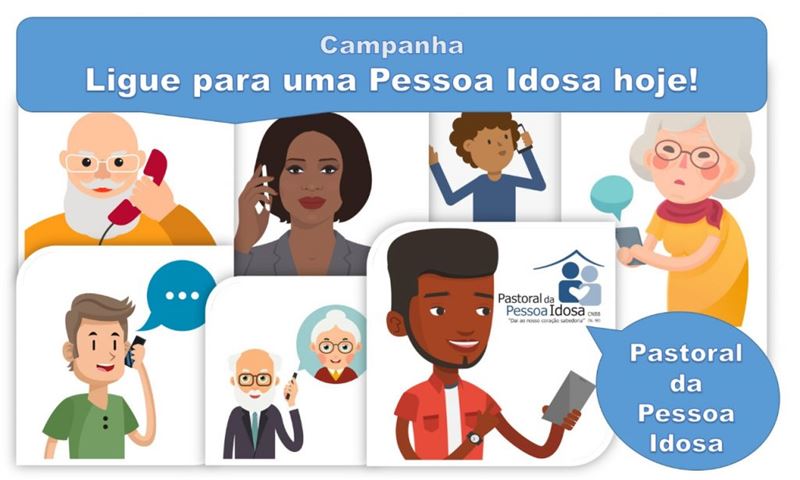Pastoral care shown to support older people at risk from COVID-19

Volunteers from the Catholic Church in Brazil helped to mitigate the impact of COVID-19 among the elderly, a new study shows.
Peter Kevern, Professor Values in Health and Social Care at Staffordshire University, partnered with The Pontifical Catholic University of São Paulo to carry out the study which looked at the contribution of the Pastoral da Pessoa Idosa (PPI) programme in Brazil.
And Professor Kevern suggests that the study findings may well assist the UK whose social care system has been severely tested during the pandemic.
PPI is a volunteer movement that uses the organisational structure of the Catholic Church of Brazil to provide a range of support to isolated elderly people right across the country. Anyone can be a volunteer in their community or in their building to support older people through the scheme.
Last year, approximately 25,000 ‘Pastoral Agents’, provided home visits, personalised practical help and support to 164,000 older people. Pastoral Agents are also trained to measure and report indicators of wellbeing such as fragility, fluid intake, annual flu vaccination, and to refer people to government agencies.
Professor Kevern explained: “Brazil has a fragile social infrastructure so there are many unmet social needs to be addressed. The aim of this research was to estimate the contribution of the PPI programme to the health and social support of older people. Almost 4,000 volunteers were interviewed over a one-week period using a 21-item telephone questionnaire to evaluate the impact of its activities during ‘normal’ times, and how they changed to address the challenge of COVID-19.”
The arrival of COVID-19 led to a temporary stop in visits following recommendations by the World Health Organization but efforts to provide material and immaterial support and remote monitoring by phone calls were encouraged through a campaign.
Professor Kevern added: “The striking thing about PPI was how quickly and flexibly the movement responded to the pandemic. Innumerable initiatives were undertaken by volunteers such as making masks, collecting food and other donations in order to make the lives of the elderly people monitored by the PPI better throughout Brazil. This was especially important for those who live in places far from urban centres, or in peripheries of large cities where access to social and health services is limited.”
“I think we have some lessons to learn from PPI. In the UK, our social care system is also very fragile, and the experience of the early days of the lockdown, where older people were sent into care homes from hospital untested and many died from Covid-19, shows that the present system can’t cope. Voluntary movements like PPI, supported and trained by the government, may be indispensable at times of population-level stress like a pandemic. There are some challenges coming down the line – possible future pandemics, Brexit, climate change – when again we might need to adjust to an unstable and rapidly-changing situation. Organisations like PPI might be part of the answer.”
Read the full paper here - The Contribution of Church-Based Networks to Social Care in the Coronavirus Pandemic and Beyond: The Case of Pastoral da Pessoa Idosa in Brazil
WATCH: Discover more about Professor Kevern’s research in his inaugural professorial lecture The Hands of God? The Contribution of religious communities to social care
Amy Platts
Media Communications Officer
t: 01782 292702
m: 07799 341911
e: amy.platts@staffs.ac.uk
Staffordshire University is the Connected University; connected to the needs of students, academic partners, business and society. Our main city campus in Stoke-on-Trent features excellent learning and teaching facilities and good transport links. We have specialist Centres of Excellence in Healthcare Education at Stafford and Shrewsbury.
We were recognised with a Gold award in the 2019 Teaching Excellence and Student Outcomes Framework (TEF) for delivering consistently outstanding teaching, learning and outcomes for students.
We have been shortlisted for University of the Year at the THE Awards 2020 and were named ‘Midlands University of the Year’ at the Midlands Business Awards 2020.
Staffordshire University has signed up to the Civic University Agreement, pledging to play a leading role in improving the regional economy and enhancing quality of life in local communities. We were recognised in the top 15 for social inclusion in The Times and Sunday Times Good University Guide 2021. We aim to be a leading university for digital technologies building on our proud computing heritage and in 2019 launched Staffordshire University London’s Digital Institute which is committed to preparing students for careers in new and emerging tech industries.
We are a Top 250 Young University (Times Higher Education Young University Rankings 2020) and are connected globally, with more than 11,000 people are studying Staffordshire University degrees overseas.


